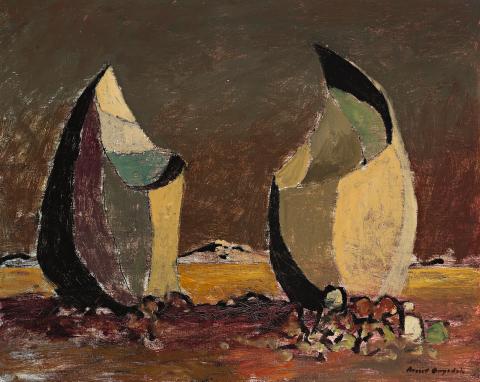SPLIT ROCKS, c.1952
RUSSELL DRYSDALE
oil on canvas
40.5 x 51.0 cm
signed lower right: Russell Drysdale
signed and inscribed verso: Russell DRYSDALE / SPLIT ROCKS
The Macquarie Galleries, Sydney
Barry Stern Galleries, Sydney
John Bremner, Perth (until 1973)
Thence by descent
Private collection, Victoria
Deutscher~Menzies, Melbourne, 4 June 2003, lot 53
Private collection, Victoria
Lawson~Menzies, Sydney, 26 March 2006, lot 36
Private collection, Sydney
Pictures from the Back Room, Macquarie Galleries, Sydney, 20 July – 6 August 1956, cat. 11
Barry Stern Galleries, Sydney, December 1970 (as ‘Twin Rocks’)
Art and Australia, vol. 5, no. 2, 1967, Barry Stern Galleries advertisement (illus., as ‘Twin Rocks’)
The impact of the visual drama is immediate. As primordial sentinels, guardians of time past and present, the split monolith is like some remnant of an antipodean Stonehenge in which echoes form. By evoking a likeness to the moonscape, Russell Drysdale pictures the other worldliness of Central Australia as something dramatically different, dressing the visually arresting scene in the rich splendour of Venetian colour. A low horizon adds to its impact, linking the work to the Aboriginal Dreamtime through its surreal intensity. It was a time when Drysdale was developing a greater simplicity of style, veiling underlying visual complexity in symbolic terms. This same appealing approach can be found in two related paintings of 1952, Desert Landscape and Road to the Black Mountains, both in the collection of the Art Gallery of New South Wales. In his insightful monograph on Drysdale, Lou Klepac wrote: ‘In the former (Desert Landscape) he is intensifying landscape into symbol, investing the rocks in the foreground with magical qualities. Road to the Black Mountains shows the artist certain of his aims, faultlessly realising a new kind of landscape’.1
Split Rocks combines technical surety with imaginative power, matched by a directness of statement that is enthralling. Delineation is precise as deep shadows take on the very presence of form itself, creating powerfully sculptural monuments of nature from a time before time began. The atmosphere is charged with silence and stillness. Thus Drysdale creates a new vision of Australia – a vision so captivating that it remains acclaimed among the most unique images of this country.
1. Klepac, L., The Life and Work of Russell Drysdale, Bay Books, Sydney, 1983, p. 137
DAVID THOMAS
